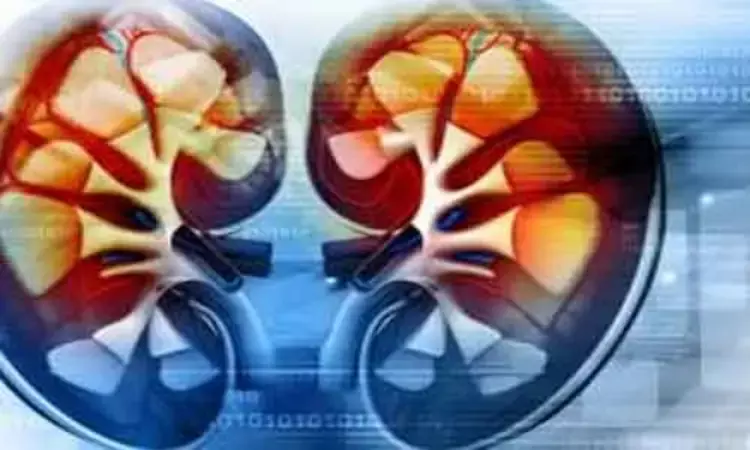- Home
- Medical news & Guidelines
- Anesthesiology
- Cardiology and CTVS
- Critical Care
- Dentistry
- Dermatology
- Diabetes and Endocrinology
- ENT
- Gastroenterology
- Medicine
- Nephrology
- Neurology
- Obstretics-Gynaecology
- Oncology
- Ophthalmology
- Orthopaedics
- Pediatrics-Neonatology
- Psychiatry
- Pulmonology
- Radiology
- Surgery
- Urology
- Laboratory Medicine
- Diet
- Nursing
- Paramedical
- Physiotherapy
- Health news
- Fact Check
- Bone Health Fact Check
- Brain Health Fact Check
- Cancer Related Fact Check
- Child Care Fact Check
- Dental and oral health fact check
- Diabetes and metabolic health fact check
- Diet and Nutrition Fact Check
- Eye and ENT Care Fact Check
- Fitness fact check
- Gut health fact check
- Heart health fact check
- Kidney health fact check
- Medical education fact check
- Men's health fact check
- Respiratory fact check
- Skin and hair care fact check
- Vaccine and Immunization fact check
- Women's health fact check
- AYUSH
- State News
- Andaman and Nicobar Islands
- Andhra Pradesh
- Arunachal Pradesh
- Assam
- Bihar
- Chandigarh
- Chattisgarh
- Dadra and Nagar Haveli
- Daman and Diu
- Delhi
- Goa
- Gujarat
- Haryana
- Himachal Pradesh
- Jammu & Kashmir
- Jharkhand
- Karnataka
- Kerala
- Ladakh
- Lakshadweep
- Madhya Pradesh
- Maharashtra
- Manipur
- Meghalaya
- Mizoram
- Nagaland
- Odisha
- Puducherry
- Punjab
- Rajasthan
- Sikkim
- Tamil Nadu
- Telangana
- Tripura
- Uttar Pradesh
- Uttrakhand
- West Bengal
- Medical Education
- Industry
Neutrophil-to-lymphocyte ratio may predict renal function decline in diabetes

Researchers have found that Neutrophil-to-lymphocyte ratio is a predictor of renal dysfunction in diabetes patients.The study has been published in Diabetes Metabolic Syndrome: Clinical Research & Reviews.
Inflammation play an important role in the pathogenesis of diabetic kidney disease.Neutrophil-to-lymphocyte ratio has been evaluated as a biomarker of inflammation and has been widely evaluated as a biomarker in various medical and surgical prognoses.However its usefulness in diabetic kidney disease is not yet known.
The researchers conducted a prospective observational study that included outpatients, comprising of 184 men aged 73 ± 11 (mean ± standard deviation) years and 174 women aged 76 ± 10 years at baseline, from a rural hospital. They examined the relationship between baseline NLR calculated by analyzing the differential leukocyte counts in the complete blood count and the 2-year estimated glomerular filtration rate (eGFR) decline rate (i.e. 2-year eGFR-baseline eGFR) ∗100/baseline eGFR. Rapid eGFR decline rate was defined as a value < -25%.
The researchers found that NLR (β = 0.138, p = 0.007) as well as presence of antidyslipidemic medication, hemoglobinA1c, and urinary albumin excretion stage were significantly and independently associated with a rapid eGFR decline rate.The multiple linear regression analysis using rapid eGFR decline rates as objective variables were adjusted for confounding factors as explanatory variables.
The multivariate-adjusted odds ratios (95% confidence interval) of the 2nd and 3rd tertiles of baseline NLR for rapid eGFR decline rate were 3.62 (0.70-18.7) and 8.03 (1.54-41.9), respectively. Multivariate-adjusted mean eGFR (95% confidence interval) values after 2 years categorized by tertile of baseline NLR were: 1st, 63.9 (61.8-66.1); 2nd, 60.8 (58.7-62.9); and 3rd, 58.9 (56.8-61.0).
The researchers concluded that these results suggest that baseline Neutrophil-to-lymphocyte ratio might be a useful biomarker for renal function decline in outpatients with type 2 diabetes. This biomarker may help evaluate renal function in diabetics.
For further reference log on to:
Dr Kamal Kant Kohli-MBBS, DTCD- a chest specialist with more than 30 years of practice and a flair for writing clinical articles, Dr Kamal Kant Kohli joined Medical Dialogues as a Chief Editor of Medical News. Besides writing articles, as an editor, he proofreads and verifies all the medical content published on Medical Dialogues including those coming from journals, studies,medical conferences,guidelines etc. Email: drkohli@medicaldialogues.in. Contact no. 011-43720751


